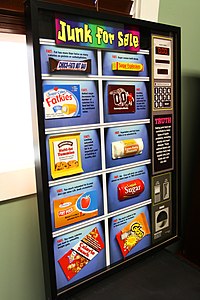
Photo from wikipedia
The study aimed to evaluate consumers’ perception of self-service foods’ nutrition labels. This qualitative and quantitative assessment was performed with potential consumers at food services. Four food labeling formats, traditional,… Click to show full abstract
The study aimed to evaluate consumers’ perception of self-service foods’ nutrition labels. This qualitative and quantitative assessment was performed with potential consumers at food services. Four food labeling formats, traditional, simplified, traffic-light, and warning, were proposed to evaluate three types of sandwiches: simple, chicken, and hamburger. Data were collected via an online survey from April to May 2020. The study included 413 subjects. The respondents preferred the traffic-light format, but there was a good understanding and acceptability of all four models. The traffic-light and warning nutrition labeling models, which showed health warnings, led to a reduction in the choice of the Simple Sandwich and the Hamburger. Most respondents (96.1%, n = 397) agreed that it is necessary to complement the information on food labels with ingredients and the number of calories per serving. Therefore, it is essential to have legislation regulating such issues. Consumers’ choices improved with the increase in the information placed on the products. This research demonstrated that nutrition labels explain what exists currently and that consumers require such information. Thus, food labeling may positively influence consumers’ choices.
Journal Title: Foods
Year Published: 2022
Link to full text (if available)
Share on Social Media: Sign Up to like & get
recommendations!